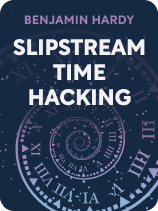

This article is an excerpt from the Shortform book guide to "Slipstream Time Hacking" by Benjamin Hardy. Shortform has the world's best summaries and analyses of books you should be reading.
Like this article? Sign up for a free trial here.
Do you have a daily routine? How does a schedule help slow down time?
Benjamin Hardy recommends that you structure your days around the goal of slowing time. To do so, you need to build consistent routines, avoid overdoing tasks, and focus on being present.
Continue reading for more on how to schedule your day.
Set Up Your Day to Help You Slow Down
Hardy writes that many people hurry through their lives and spend their days rushing toward deadlines or goals. By letting this process consume their time and attention, they speed up their time rather than slowing it down. But you can avoid this pitfall by figuring out how to schedule your day. We’ll consider three habits that Hardy recommends cultivating so you can slow time on a daily basis.
#1: Build Routines That Help You Get More Out of Your Time
First, Hardy recommends starting your day with a consistent routine. Sticking to a routine not only curtails the problem of decision fatigue—the phenomenon where making decisions depletes your mental and physical energy—but can also help you to focus on your most important priorities and start dilating time at the beginning of your day. (Shortform note: Establishing a morning routine is often cited as a smart way to guard against decision fatigue. However, that only works if your morning routine avoids adding more decisions to your day. To minimize morning decisions, you can pick an outfit, pack your lunch, and make a to-do list the night before. Come morning, you can just focus on your routine and your priorities for the day.)
Hardy also advises building routines that enable you to experience “flow”—the state of mind where you become fully and purposefully immersed in a task, as explained by Mihaly Csikszentmihalyi in Flow—because when you’re in this state of consciousness, time seems to slow down. (Shortform note: While Hardy recommends using “flow” states to slow time down, Csikszentmihalyi explains that when you enter a flow state, you might feel like time has slowed down or like it’s passing more quickly. But whether flow speeds time up or slows it down, learning to cultivate this unique mental state can help you focus all your attention on what you’re doing. That, in turn, can help you make faster progress toward your goals.)
#2: Don’t Let Tasks Demand More Time Than They Deserve
Second, Hardy advises that you should curb the tendency to spend too much time on tasks you could complete more quickly. Hardy explains that according to Parkinson’s Law, your work will take up all the time you allot for it. In other words, the more time you set aside for a task, the more time it will take. He also contends that if you think a task is unimportant, it will take a long time to finish it. Similarly, if you think a task is complicated, it will take longer to complete.
(Shortform note: Parkinson’s Law was created by historian Cyril Northcote Parkinson, who wrote in a 1955 satirical essay that “work expands so as to fill the time available for its completion.” Parkinson’s concern wasn’t so much about how everyday people spend their time but about the tendency of bureaucracy to expand even with fewer people and less work to oversee. That said, his premise is that the complexity of a task tends to increase as we allot more time to it. The observation might help explain why tasks we’ve put off just get more daunting: When we procrastinate on tasks that don’t feel valuable or those that make us feel unpleasant emotions like anxiety or self-doubt, those tasks then take us even longer to complete.)
Hardy’s solution for our inefficiency with our time—in addition to working only on the most important tasks—is to stop setting expectations that make tasks take up more time than necessary. In other words, don’t set aside needlessly large chunks of time for tasks. He recommends breaking tasks down into smaller pieces that are easier to accomplish quickly. (Shortform note: Hardy’s advice for countering Parkinson’s Law aligns with other psychologists’ suggestions. Experts recommend setting realistic deadlines that help you get things done as soon as possible, writing down your goals, tracking your progress toward them, prioritizing your tasks and breaking them down into smaller pieces, and taking regular breaks.)
#3: Focus on Being Present
Finally, Hardy writes that it’s important to spend time every day focused on the people around you. Remember that the point of slipstream time hacking is to make your life more meaningful. One way to do that is to take advantage of the slowing of time to be more present with the people in your life. For many of us, one of the things we value most is the time we get to spend with our family, friends, and community. Slipstream time hacking can give you more of that time—but you have to be present and mindful to enjoy it.
(Shortform note: People have long struggled to avoid distraction and to remain present and mindful—as illustrated by Henry David Thoreau’s concerns about distraction in his 1854 book Walden. Many experts recommend practicing mindfulness to be present with the people in your life and stay alert to what you experience. In The Happiness Trap, Russ Harris writes that mindfulness entails deliberately existing in the present and being aware of and receptive to what you experience. Researchers have found that mindfulness can help you improve your focus, reduce stress, become less emotionally reactive, and develop flexibility in your thinking.)

———End of Preview———
Like what you just read? Read the rest of the world's best book summary and analysis of Benjamin Hardy's "Slipstream Time Hacking" at Shortform.
Here's what you'll find in our full Slipstream Time Hacking summary:
- That your far-off goals might be closer than you think
- How to buy more time by making time run slower
- Why you might want to apply Einstein’s theory of relativity to your life






